Еxperimental Review of the Efficiency of the Cultural Compatibility Formation of Future Medical Nurses
Abstract
Changes in the economic, social, medical and spiritual life of a society contribute the development of professional aspects of the specialists’ personality. These requirements are especially relevant for those medical colleges where nurses are trained. The purpose of the article is to describe the experimental research, analysis and interpretation of its results.
Having analyzed the scientific literature, the results of the preliminary stage of the experiment concerning the formation of cultural competence of future nurses, pedagogical conditions were defined: introduction of cultural disciplines into the educational process; increase of professional competence of teachers of humanitarian disciplines; development of positive motivation of students through their participation in different types of practice and in non-auditing work; application of innovative educational technologies with the purpose of teaching to predict possible cultural obstacles in conditions of intercultural professional communication and find ways of their elimination; the ability to think in a comparative aspect, to evaluate another linguoculture, to understand the features of the representatives of the foreign-language cultural community in professional situations; consider their country in aspect of crossing cultures and demonstrate cultural tolerance.
The examination of the effectiveness of the cultural competence of future nurses, using our created model for forming the cultural competence of future nurses and providing a set of identified pedagogical conditions, was conducted within the framework of a pedagogical experiment, which includes the recording, forming and final stages, aimed at tracking the dynamics of changes of several variables.
The examination of students and the testing of the formation of cultural competence before and after the experiment showed that the level of cultural competence of future nurses has increased significantly. If we analyze the changes that have taken place in the entire sample of participants in the experiment, in all experimental and control groups (EG1, EG2, EG3, EG4, CG), it should be noted that the final test revealed significant differences in the distribution of students by levels of both in separate components and the formation of cultural competence in general.
Key words: future medical nurse, cultural competence, professional qualities, experiment, pedagogical conditions, role of studying, medical college.
Downloads
References
Бібік, Н.М. (2004). Компетентнісний підхід: рефлексивний аналіз застосування. Компетентнісний підхід у сучасній освіті : світовий досвід та українські перспективи, (с. 45–50). Київ: «К.І.С.» / Bibik, N.M. (2004). Kompetentnisnyi pidkhid: refleksyvnyi analiz zastosuvannia. [Competency Approach: Reflexive Analysis of Application]. Kompetentnisnyi pidkhid u suchasnii osviti: svitovyi dosvid ta ukrainski perspektyvy, (pp. 45–50). Kyiv: «K.I.S» [in Ukrainian].
Болгаріна, В. (2003). Культурологічний підхід як імператив управління школою. Освіта і управління, 6, 29–34. / Bolharina, V. (2003). Kulturolohichnyi pidkhid yak imperatyv upravlinnia shkoloiu [Culturological Approach as an Imperative School Management]. Osvita i upravlinnia, 6, 29–34. [in Ukrainian].
Борбич, Н. В. (2011) Проблема соціальної компетентності в науковій літературі. Науковий вісник Волинського національного університету імені Лесі Українки, 55, 116–117. / Borbych, N. V. (2011) Problema sotsialnoi kompetentnosti v naukovii literaturi [The Problem of Social Competence in Scientific Literature]. Naukovyi visnyk Volynskoho natsionalnoho universytetu imeni Lesi Ukrainky, 55, 116–117. [in Ukrainian].
Галенко, А.М. (2012). Культурологічна компетентність у структурі професійних компетентностей студентів філологічних спеціальностей. Взято з http://nbuv.gov.ua/UJRN/nvd_2012_4_25 (дата звернення: 14.03.2019) / Halenko, A.M. (2012). Kulturolohichna kompetentnist u strukturi profesiinykh kompetentnostei studentiv filolohichnykh spetsialnostei [Culturological Competence in the Structure of Professional Competences of Students of Philological Specialties]. Retrieved from: http://nbuv.gov.ua/UJRN/nvd_2012_4_25 (last accessed 14.03.2019) [in Ukrainian].
Дубасенюк, О.А. (2011) Професійна педагогічна освіта: компетентнісний підхід [моногр.]. Житомир: Вид-во ЖДУ ім. І. Франка / Dubaseniuk, O.A. (2011) Profesiina pedahohichna osvita: kompetentnisnyi pidkhid [Professional Pedagogical Education: Competency Approach]. Monograph. Zhytomyr: Vyd-vo ZhDU im. I. Franka [in Ukrainian].
Роскопіна, Ю.О. (2013). Формування культурологічної компетентності майбутніх правників у процесі навчання іншомовного професійного спілкування на прикладі США. Взято з http://nbuv.gov.ua/UJRN/VchdpuP_2013_111_64 (дата звернення: 14.03.2019) / Roskopina, Yu.O. (2013). Formuvannia kulturolohichnoi kompetentnosti maibutnikh pravnykiv u protsesi navchannia inshomovnoho profesiinoho spilkuvannia na prykladi SShA [Formation of Cultural Competence of Future Employees in the Process of Teaching Foreign Language of Professional Communication on the Example of the USA]. Retrieved from http://nbuv.gov.ua/UJRN/VchdpuP_2013_111_64 (last accessed 14.03.2019) [in Ukrainian].
Nursing RN Adult. School of Nursing and Midwifery. (n.d.). Retrieved from https://www.salford.ac.uk/ [in English].
Standards for Pre-Registration Nursing Education. (2010). Nursing and Midwifery Council. Retrieved from https://www.nmc.org.uk/globalassets/sitedocuments/standards/nmc-standards-for-pre-registration-nursing-education.pdf. [in English].
Copyright (c) 2019 Pedagogical Discourse

This work is licensed under a Creative Commons Attribution-NonCommercial-ShareAlike 4.0 International License.

















